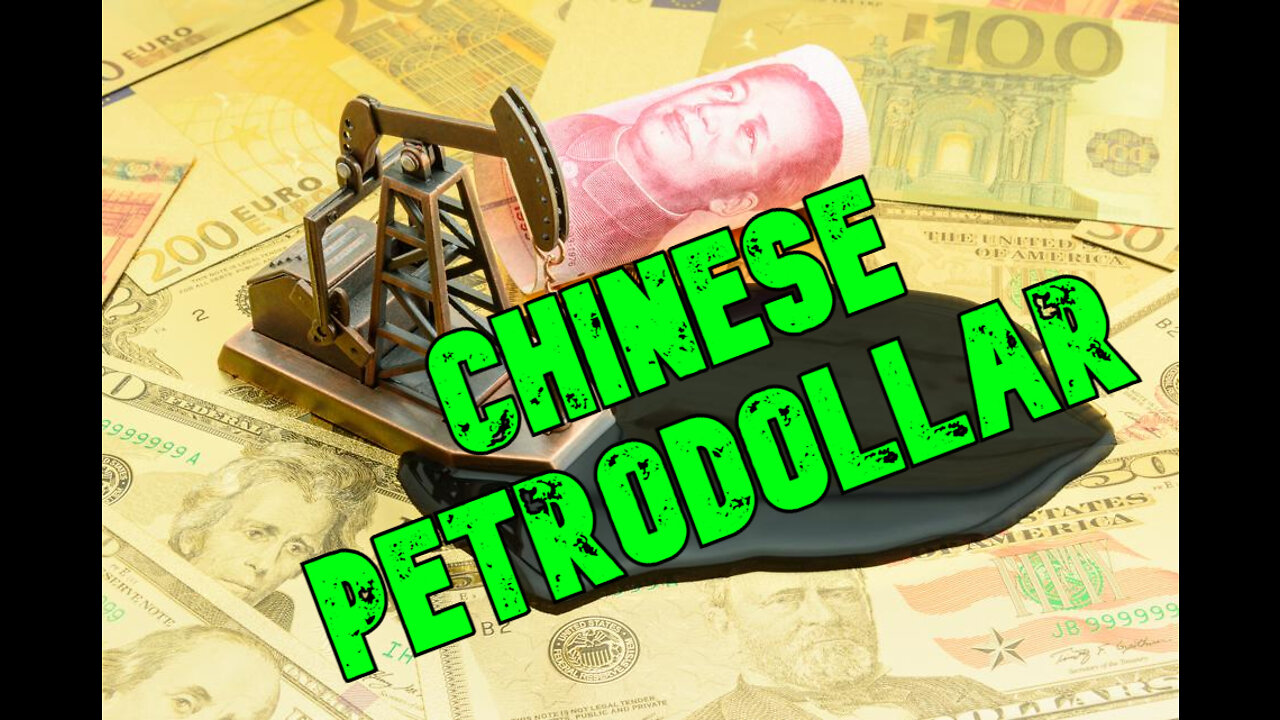Premium Only Content

SAY HELLO TO THE NEW CHINESE PETRODOLLAR! This Event Will Affect Every Human on This Planet
This change can be Made Overnight ! so wake up !
SAY HELLO TO THE NEW CHINESE PETRODOLLAR! This Event Will Affect Every Human on This Planet
The yuan is getting a boost from reports that Saudi Arabia is in talks with Beijing to price some oil sales in the Chinese currency, a development that analysts believe may be some way off.
While a deal between the world’s biggest producer and importer of oil could undermine the dominance of the dollar and euro in such trades, market watchers expect that to be a drawn out process. The main hurdle is the yuan’s limited convertibility and that it is still tightly managed by China.
The onshore yuan rose as much as 0.4% to 6.3460 per dollar, most since December 31 after The Wall Street Journal reported the talks between China and Saudi Arabia. China’s vow to keep the stock market stable also supported the currency. Global Times, a Chinese state-owned media, reported that India is to buy Russian oil at discounted prices and is considering the yuan as a reference currency for payments.
The reports are adding to speculation the yuan will expand its global use in commodity trades as it benefits from an accelerated de-dollarization in the wake of the Russia-Ukraine war. China started its own crude-oil contract in Shanghai in 2018 that allows direct participation by international investors to price oil in yuan.
Here’s what strategists and analysts are saying:
Mitul Kotecha, chief emerging markets Asia and Europe strategist at TD Securities
Most oil is priced in dollars and it seems unlikely that there would be a quick move away from that by commodity-producing countries simply because of the logistics involved.
“The yuan remains far from being a rival to the dollar at this stage. Nonetheless, it may encourage greater yuan use by other countries in trade and the share of yuan in trade is likely to grow,” he said. “The fact that the yuan is not a fully convertible currency acts as a stumbling block.”
Fiona Lim, senior FX strategist at Malayan Banking Bhd
“At this point, it feels more like a symbolic breakaway from the Petrodollar. Should this gain traction into more yuan-denominated oil deals beyond China-Saudi Arabia trades, yuan can become a more dominant reserve currency for central banks.”
Khoon Goh, head of Asia research at Australia & New Zealand Banking Group
Based on calculations referring to 2019 data, 10%-20% of the China oil imports from Saudi Arabia done in yuan, which would be about $4 billion-$8 billion, which at the margin will be supportive for the yuan.
“Saudi could use the yuan to pay for imports from China or they could invest it in Chinese government bonds, diversifying their FX reserves.”
Terence Wu, FX strategist at Overseas-Chinese Banking Corp
The discussion between China and Saudi Arabia about pricing oil contracts in yuan has been on and off over the past few years, and there is little to suggest that there has been any concrete progress toward an agreement in this instance. The timing of this headline -- amid geopolitical uncertainty -- also adds a layer of skepticism.
“Any concrete progress and broader adoption would be a near-term positive for the yuan from a feel-good angle, but the medium-term implications are less clear. Overall, it may be premature to explicitly consider this to be a win for yuan internationalization.”
David Chao, global market strategist for Asia-Pacific ex-Japan at Invesco Ltd.
“Confidence in the dollar and euro has been eroded after the U.S. and many of its allies froze the Russian Central Bank’s foreign reserves and removed many of its financial institutions from SWIFT. It makes sense for the Saudi and other governments around the world to think about diversifying their stores of wealth -- which should provide a boost to the internationalization of the yuan.”
“The biggest headwind to the internationalization of the yuan is that it continues to be non-convertible in most places in the world. Chinese policy makers are not likely to give up control of it’s currency and expose it to outside forces.”
Michael Every, global strategist at Rabobank
“Even if we assume all Saudi-China trades switch to yuan, that is $320 million per working day versus the $6.6 trillion global daily FX market.”
Saudi Arabia would end up accumulating yuan, which is of no use unless everyone else makes the same shift. Saudi Arabia would probably still price oil in dollars given its own balance sheet, and just allow some Chinese oil payment in yuan.
“Yet geopolitically this news is highly significant. First and foremost, it suggests China is preparing for possible U.S. sanctions.”
Guo Jiayi, chief FX analyst at CIB Research and Consulting Co.
The Russian-Ukrainian war has accelerated the reshaping of the global currency system, and Saudi Arabia’s consideration of using the yuan to settle oil transactions would be an important step.
“We expect more countries will use yuan for trade settlement and as a reserve currency. Despite recent outflow pressure, China’s real yield remains appealing to overseas investors with its contained inflation. The yuan paid in China’s import could flo
-
 13:33
13:33
Mike Martins Channel
4 days ago $0.06 earnedHow the Liberal Party "will" win the 2025 Slection In Canada via Public Sector vote, Mass Deception
4022 -
 54:47
54:47
Steven Crowder
2 hours agoSharpening Spiritual Tools, Handling Infidelity & Manifesting Destiny | Tough Love with Guru Crowder
69.3K248 -
 LIVE
LIVE
The Big Mig™
6 hours agoGlobal Finance Forum From Bullion To Borders We Cover It All
1,772 watching -
 LIVE
LIVE
LFA TV
16 hours agoGUTTING THE GOVERNMENT! | LIVE FROM AMERICA 2.21.25 11AM
5,384 watching -
 LIVE
LIVE
Film Threat
15 hours agoTHE MONKEY + DAISY RIDELY IN CLEANER + TONS OF REVIEWS | Film Threat Livecast
81 watching -
 28:38
28:38
pewculture
2 hours agoThe Pew Culture Podcast #12 - Suicide Squad
8.21K1 -

Caleb Hammer
1 hour agoIf Her Husband Sees This, It's Over. | Financial Audit
6.11K -
 LIVE
LIVE
Major League Fishing
1 day agoLIVE Tackle Warehouse Invitationals, Stop 1, Day 1
281 watching -
 DVR
DVR
Bannons War Room
3 days agoWarRoom Live
1.02M220 -
 2:03:31
2:03:31
Matt Kohrs
11 hours agoPAYDAY FRIDAY!!! || The MK Show
40.3K3